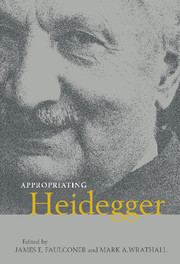Book contents
- Frontmatter
- Contents
- List of contributors
- Acknowledgments
- 1 Appropriating Heidegger
- PART 1 THINKING OUR AGE
- 2 Philosophy, thinkers, and Heidegger's place in the history of being
- 3 Night and day: Heidegger and Thoreau
- 4 Heidegger's alleged challenge to the Nazi concepts of race
- 5 Heidegger and ethics beyond the call of duty
- PART 2 HEIDEGGER IN CONTEXT
- PART 3 READING BEING AND TIME
- Index
3 - Night and day: Heidegger and Thoreau
Published online by Cambridge University Press: 22 September 2009
- Frontmatter
- Contents
- List of contributors
- Acknowledgments
- 1 Appropriating Heidegger
- PART 1 THINKING OUR AGE
- 2 Philosophy, thinkers, and Heidegger's place in the history of being
- 3 Night and day: Heidegger and Thoreau
- 4 Heidegger's alleged challenge to the Nazi concepts of race
- 5 Heidegger and ethics beyond the call of duty
- PART 2 HEIDEGGER IN CONTEXT
- PART 3 READING BEING AND TIME
- Index
Summary
In the preface to my little book on Walden, published in 1972, I say that “I assume the rhyming of some of the certain concepts I emphasize – for example, those of the stranger … of the everyday, of dawning and clearing and resolution – with concepts at play in Nietzsche and in Heidegger.” I had then read of Heidegger only Being and Time, and I say nothing about what it might mean to “assume” this connection, nor why I invoke a metaphor of “rhyming” to mark it – as if the connections will, or should, by the end become unmistakable but at the beginning are unpredicted. Since then I have periodically gone somewhat further in various connections with each of these writers, but what has brought me to another stop with Heidegger, specifically in conjunction with Thoreau, are two lecture courses of Heidegger's published posthumously in the 1980s and recently translated into English, most obviously the volume entitled Hölderlin's Hymn “The Ister,” given in 1942 (imagine), and behind it The Fundamental Concepts of Metaphysics (from 1929–1930, the years almost immediately after the appearance of Being and Time). The Hölderlin text is an obvious cause for stopping given that “Ister” is the name of a particular river (or of a significant part of the river Danube) and “Walden” is the name of a particular woodland lake.
- Type
- Chapter
- Information
- Appropriating Heidegger , pp. 30 - 49Publisher: Cambridge University PressPrint publication year: 2000



